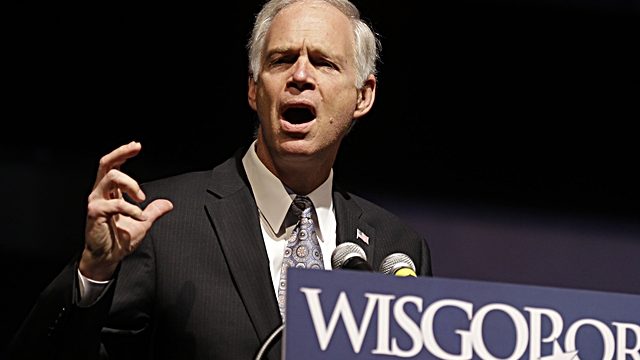Wisconsin’s Johnson says border crisis an ‘abuse of federal power’

HUSH, HUSH: U.S. Sen. Ron Johnson, R-Wis., is highly critical of the federal government for being relatively quiet on its search for facilities for undocumented children.
By Adam Tobias | Wisconsin Reporter
MADISON, Wis. — U.S. Sen. Ron Johnson, R-Wis., says the federal government isn’t being honest about the wave of unaccompanied child immigrants crossing the Mexican border.
Johnson said he didn’t learn the U.S. Department of Health and Human Services was asking the city of Madison to look for a 90,000-square-foot facility to shelter 150 to 250 undocumented minors until he spoke this week with Wisconsin Reporter, which first reported those details Tuesday.
Johnson also said he was not immediately made aware of the Federal Emergency Management Agency contacting the Milwaukee chapter of Catholic Charities to find three different sites to accommodate up to 300 children who illegally entered the country.
“It just shows further abuse of federal power,” Johnson told Wisconsin Reporter. “And let’s face it, I would say, in many respects, an abuse of presidential authority as well.”
SLEEP WELL: Children who have crossed the U.S.-Mexico border may be housed in Madison and Milwaukee.
Johnson also said the federal government isn’t releasing information about the shelters because of the health scares coming with the undocumented children.
An outbreak of pneumonia and swine flu was reported last week at a Navy base near Los Angeles where close to 600 child migrants were staying.
“As the unaccompanied children continue to be transported to shelters around the country on commercial airlines and other forms of transportation, I have serious concerns that the diseases carried by these children may begin to spread too rapidly to control,” U.S. Rep. Phil Gingrey, R-Ga., said in a July 7 letter to the Centers for Disease Control and Prevention.
In order to help stop the flood of undocumented minors into the county, Johnson said the federal government needs to do away with the incentives — like billions in welfare for non-U.S. citizens and deferred action for children — that entice the illegal actions.
That would require citizens and state lawmakers to keep pressure on their federal representatives, Johnson said.
But it’s unclear to what extent Wisconsin Gov. Scott Walker might get involved.
“Obviously, this is a heartbreaking humanitarian issue,” said Jocelyn Webster, Walker’s communications director. “However, this is a federal issue for which the federal government must find a solution.”
Nebraska’s congressional delegation already has introduced legislation designed to force the Obama administration to be more transparent about the children that have been placed in the state as part of the border crisis.
But Johnson said that is not enough.
After allocating more resources to secure the border, Johnson said he wants his colleagues to rewrite legislation that “opened up the floodgates” in the first place and speed up deportation cases.
“We can pass these laws very quickly,” Johnson told Wisconsin Reporter. “They are not particularly complex. We just have to set up a very streamlined process for processing these folks and sending them back to their home country.”
All those proposals would be much cheaper and more effective than Obama’s request for $3.7 billion in emergency aid to confront the large number of undocumented children crossing the border illegally, Johnson said.
The senator said the feds are staying relatively mum on the proposed facilities to help prevent a backlash from the public.
Earlier this month, demonstrators in Murrieta, Calif., successfully turned away three busloads of about 140 undocumented immigrants who were being taken to U.S. processing centers.
Protests from local elected officials in Maryland this past weekend also forced the Department of Health and Human Services to cancel its plans to send unaccompanied migrant children to an Army Reserve facility close to Baltimore.
“As long as this is somebody else’s problem, people aren’t going to get particularly outraged,” Johnson told Wisconsin Reporter. ”All of a sudden, when it’s in your backyard and it’s a problem for your community, your state, people will demand action.”







